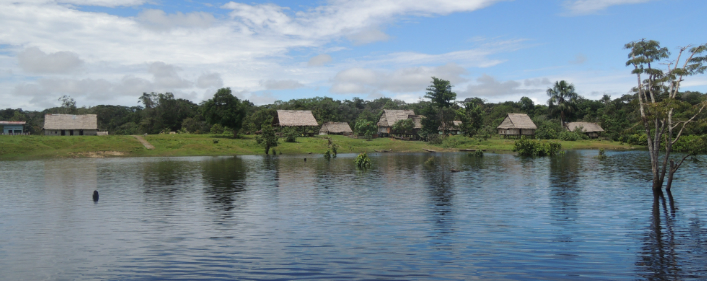- ACCIONA's corporate foundation expands its Luz en Casa Amazonía project to take electricity to more than 5,000 people who live in 30 indigenous communities in the department of Loreto in the Peruvian Amazon.

ACCIONA is extending its “Luz en Casa Amazonía” (Light at Home Amazonia) program, which to date has provided electricity to more than 400 homes of the Kichwa indigenous community in the Napo Amazon basin. The program, which installs home photovoltaic systems, is being extended to 1,000 more families from communities in other tributaries of the Amazon.
This new phase of the program will complete the electrification of communities in the Napo basin and begin to replicate the model in households in other river basins in the department of Loreto.
The aim is to give access to electricity to an additional 1,000 households (about 5,000 beneficiaries) in 30 localities bordering the Napo, Ucayali and Marañón rivers. In addition, acciona.org will inform and train beneficiaries about the benefits of the service, the correct use of the photovoltaic kits, and how to use electricity efficiently.
For this, third generation photovoltaic systems will be used. These are easily manageable, transportable, robust and free of contaminants, which makes them very suitable for very remote and environmentally sensitive environments.
The equipment offers more than four hours of electric light. It can also charge of a mobile phone and operate an electric appliance (such as a radio or television) for two hours.
Madrid’s Polytechnic University, a partner in this project, will assess the effectiveness of the program’s processes with a view to enhancing the scalability of Luz en Casa Amazonía.
The project is co-financed by the Spanish Agency for International Development Cooperation (AECID), within its 2018 funding program for innovation projects for development.
This new phase of Luz en Casa Amazonía will be carried out respecting the traditions and ways of life of indigenous communities, and following international standards on the protection of indigenous rights.
In this way, acciona.org reinforces its commitment to voluntary participation with continuous interaction with representatives of local communities and users, not only in the Peruvian Amazon, but also in the other areas of operation in Peru, Mexico and Panama, where it also provides electricity to households belonging to different indigenous communities.
Amazonia and electrification: the challenge of respecting the environment and improving quality of life
The Amazon region is an area of very high ecological value with more than 6.7 million km2 spanning nine different countries. Amazonian communities, mostly indigenous people of different ethnic groups, live in remote and dispersed locations that are accessed exclusively by river, with extreme conditions of temperature and rainfall.
This, together with the cost and impact of the construction and maintenance of conventional electricity networks, makes access to conventional electrification unfeasible. As a result, an indeterminate number of people, estimated at several million, have no access to electricity in the Amazon.
Many communities in the Amazon have access to diesel generators, but the use of fossil fuels to generate electricity pollutes the environment and rarely provides more than three hours a day of electricity – when communities can afford it. Others use candles, fuel lamps or batteries for flashlights and radios, which may also cause unwanted health and environmental side effects.
The challenge for acciona.org has been to develop a model of electricity supply with renewable energy and criteria of technical-economic sustainability and affordability.
Positive impacts: health, educational and environmental improvements
The main uses that households give to electricity are lighting to extend study hours (67%), prolonging productive activities (43%) and preparing meals (21%).
In addition, abandoning the use of other forms of lighting previously used, such as battery-operated flashlights, lighters/oil lamps and candles - which do not provide sufficient light intensity and generate harmful fumes - reduces the incidence of eye and lung diseases.
In addition, the use of photovoltaic home kits have a positive environmental impact, in an environment of high ecological value, by displacing diesel generators, eliminating the use and uncontrolled disposal of batteries, and avoiding the emission of noxious gases from kerosene lamps.
acciona.org and the Sustainable Development Goals
Access to Luz en Casa's electric service has a positive impact on the economy, society and the environment and is in line with the 17 Sustainable Development Objectives (SDS) of the United Nations Agenda 2030, directly favoring OD7: affordable and non-polluting energy.
Acciona.org works to bring access to energy, water and sanitation to very low-income people, with a focus on technological innovation and management.
Since 2008, acciona.org - formerly ACCIONA Microenergy - has provided access to electricity to more than 50,000 people in isolated rural areas of Peru, Mexico and Panama. The Foundation is also carrying out projects to provide isolated communities with other basic services such as water, sanitation and safe kitchens, beginning in the Mexican state of Oaxaca. In this way, ACCIONA's corporate foundation taps the company's business expertise in renewable energy, water management and social infrastructure - with the goal of contributing to the Sustainable Development Goals of universal access to basic sanitation, drinking water and access to electricity.